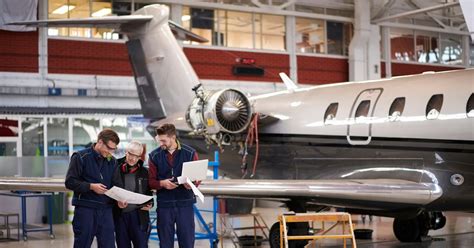Are you interested in a career in the aerospace industry? Aerospace technicians play a crucial role in the development, testing, and maintenance of aircraft and spacecraft. In this blog post, we will explore the world of aerospace technician salaries and the factors that influence them.
From the importance of aerospace technicians to the education and training requirements, as well as the potential salary growth for experienced technicians, we will delve into every aspect of this lucrative profession. We will also discuss how specializations and geographical location can impact salaries, as well as the benefits and perks that come with being an aerospace technician.
If you’re considering a career as an aerospace technician, or are already in the industry and looking to negotiate higher salaries, this post will provide you with valuable insights and tips to help you take flight in the aerospace industry with lucrative salaries.
Table of Contents
What is an Aerospace Technician?
An Aerospace Technician is a professional who is responsible for maintaining, testing, and repairing aircraft and spacecraft. They work in a variety of settings, including manufacturing facilities, aerospace research and development laboratories, and maintenance hangars. Aerospace technicians play a crucial role in ensuring the safety and functionality of aircraft and spacecraft, and their work is essential to the success of the aerospace industry.
One of the primary responsibilities of an aerospace technician is to perform routine maintenance and inspections on aircraft and spacecraft. This includes checking for wear and tear, testing systems and components, and making any necessary repairs or adjustments. They also play a key role in troubleshooting and diagnosing issues with aircraft and spacecraft, and they often work closely with engineers and other professionals to identify and address any problems that may arise.
In addition to their technical duties, aerospace technicians also need to have strong critical thinking and problem-solving skills. They must be able to analyze complex systems and equipment, identify potential issues, and develop effective solutions. Attention to detail is also crucial in this field, as even minor errors or oversights can have serious consequences in the aerospace industry.
Overall, aerospace technicians are skilled professionals who play a vital role in ensuring the safety and functionality of aircraft and spacecraft. Their expertise and dedication are essential to the success of the aerospace industry, and they are instrumental in keeping the skies and space safe for travel and exploration.
The Importance of Aerospace Technicians
Aerospace technicians play a crucial role in the aerospace industry, ensuring the safety and efficiency of aircraft and spacecraft. Their technical expertise and attention to detail are essential for maintaining and repairing complex aerospace systems. Without skilled aerospace technicians, the industry would be unable to operate at the high standards required for aviation and space exploration.
Aerospace technicians are responsible for conducting inspections, troubleshooting issues, and performing maintenance on aircraft and spacecraft. Their role is essential for ensuring the proper functioning of critical systems, such as engines, avionics, and life support systems. Their meticulous work helps to prevent potential malfunctions and safety hazards, which could have serious consequences for both passengers and crew.
In addition to maintenance and repair work, aerospace technicians also contribute to the development and testing of new aerospace technologies. Their expertise is invaluable during the design and construction of aircraft and spacecraft, as they can provide insights into the practical aspects of implementation and operation. Aerospace technicians help to ensure that new aerospace systems are not only innovative, but also reliable and safe for use.
Overall, the work of aerospace technicians is of utmost importance in the aerospace industry. Their technical skills and knowledge are vital for maintaining the safety and functionality of aerospace systems, as well as for driving innovation in the field. Without the dedication and expertise of aerospace technicians, the industry would struggle to meet the stringent demands of modern aviation and space exploration.
Factors Influencing Aerospace Technician Salaries
One of the key factors that influence the salaries of aerospace technicians is their level of experience. Entry-level technicians typically earn lower salaries compared to those with several years of experience in the industry. As technicians gain more experience, they are able to take on more complex tasks and responsibilities, which often leads to higher pay.
Another important factor is the level of education and training that aerospace technicians have received. Those with advanced degrees or specialized certifications may be able to command higher salaries than those with only a high school diploma or an associate degree. Continued education and staying up-to-date with the latest technology and industry trends can also positively impact an aerospace technician’s earning potential.
Geographical location is also a significant influencer of aerospace technician salaries. Technicians working in areas with a high cost of living or in regions with a strong demand for aerospace professionals may receive higher compensation than those working in less densely populated areas or regions with a lower demand for their skills.
Lastly, the type of specialization that an aerospace technician has can greatly affect their earning potential. Specialized skills in areas such as avionics, propulsion systems, or aircraft maintenance can lead to higher salaries compared to technicians with more general skill sets. Aerospace technicians who are willing to undergo additional training to develop specialized skills can position themselves to earn top salaries in the industry.
Education and Training Requirements for Aerospace Technicians
When considering a career as an aerospace technician, it is crucial to understand the necessary education and training requirements. Aerospace technicians are responsible for assembling, maintaining, and repairing aircraft and spacecraft, making their role vital to the aerospace industry.
Aspiring aerospace technicians typically need a high school diploma or equivalent to start their journey in this field. However, most employers prefer candidates who have completed postsecondary education or training programs in aviation maintenance or a related field. These programs provide a comprehensive understanding of aircraft systems, blueprint reading, and aircraft regulations.
In addition to formal education, aerospace technicians must complete on-the-job training to gain practical experience. This hands-on training may take place at an airline’s maintenance facility, aerospace manufacturer, or aviation maintenance school. During this training, technicians learn how to inspect and repair aircraft components, troubleshoot mechanical issues, and use specialized tools and equipment.
Furthermore, aspiring aerospace technicians may pursue certifications from the Federal Aviation Administration (FAA) to enhance their credentials and demonstrate their expertise in specific areas of aircraft maintenance. These certifications often require passing written and practical tests to ensure that technicians have the knowledge and skills necessary to perform their duties safely and effectively.
Average Salaries for Entry-Level Aerospace Technicians
Entry-level aerospace technicians are essential to the functioning of the aerospace industry. These professionals work on aircraft, spacecraft, and defense systems, ensuring that they are in top working condition. The average salary for entry-level aerospace technicians varies depending on factors such as experience, education, and geographical location.
According to the Bureau of Labor Statistics, the median annual wage for aerospace engineering and operations technicians was $67,240 as of May 2020. However, entry-level technicians may earn slightly lower salaries as they gain experience in the field.
It’s important to note that aerospace technicians working in different sectors of the industry may have different average salaries. For example, entry-level technicians working in aerospace product and parts manufacturing may earn a different salary compared to those employed by the federal government or in scientific research and development services.
Entry-level aerospace technicians should also consider potential opportunities for salary growth as they gain experience and additional certifications. With dedication and continuous learning, entry-level technicians can work their way towards higher salaries and more advanced positions within the aerospace industry.
Potential Salary Growth for Experienced Aerospace Technicians
Experienced aerospace technicians have the potential to experience substantial salary growth as they progress in their careers. Many factors contribute to this growth, including increased skills and expertise, additional certifications, and years of experience in the field. Aerospace technicians who have proven themselves to be reliable, knowledgeable, and efficient can expect their salaries to increase significantly over time.
As aerospace technicians gain more experience, they often take on more responsibilities within their organizations. This can include supervisory roles, project management, or specialized technical positions. With each new role comes the opportunity for increased pay and benefits, as companies recognize the value of their experienced employees and reward them accordingly.
Furthermore, as the aerospace industry continues to grow and evolve, the demand for experienced technicians will also increase. This heightened demand creates a competitive market for experienced technicians, driving up their salaries as companies vie for top talent. Aerospace technicians with a proven track record of success can leverage their experience to negotiate higher salaries and better benefits packages.
Overall, the potential for salary growth for experienced aerospace technicians is significant. With the right combination of skills, experience, and industry knowledge, technicians can position themselves for continued career advancement and increased earning potential in the dynamic and high-demand field of aerospace technology.
Specializations and Their Impact on Salaries
Specializing in a specific area within the aerospace industry can have a significant impact on an aerospace technician’s salary. By pursuing additional training and certifications in a specialized field, technicians can increase their earning potential and marketability to employers.
Common specializations within the aerospace industry include avionics, aircraft maintenance, propulsion systems, and quality control. Technicians who choose to specialize in avionics, for example, are often able to command higher salaries due to the complexity and critical nature of the work involved.
In addition to higher salaries, specializing can also open up opportunities for advancement within the industry. Aerospace technicians who have specialized knowledge and experience are often sought after for leadership roles and higher-level positions, leading to potential career growth and increased earning potential.
Ultimately, choosing a specialization can have a lasting impact on an aerospace technician’s salary and career trajectory, making it a crucial decision for those looking to maximize their earning potential in the industry.
Geographical Location and Salaries in the Aerospace Industry
Geographical location plays a significant role in determining the salaries of aerospace technicians. Different regions and countries have varying levels of demand for aerospace technology, which in turn impacts the compensation offered to professionals in this field.
For example, aerospace technicians working in developed countries such as the United States or Germany may expect higher salaries compared to those working in emerging markets. The cost of living, industry growth, and government investment in aerospace also affect the earning potential of technicians in different locations.
In addition, the presence of aerospace manufacturing hubs or research institutions can create clusters of highly paid job opportunities in particular areas. The concentration of aerospace companies and organizations in specific regions can lead to higher demand for technicians and, consequently, higher salaries.
Moreover, factors such as local taxes, labor laws, and economic conditions can further influence the income of aerospace technicians in different geographical locations.
Benefits and Perks in the Aerospace Technician Profession
Working as an aerospace technician can have many benefits and perks, making it an attractive career choice for many individuals. One of the key benefits of being an aerospace technician is the opportunity to work with cutting-edge technology and machinery. Aerospace technicians are often at the forefront of technological advancements in the aerospace industry, allowing them to gain valuable experience and knowledge that can be applied to various fields.
Another perk of the aerospace technician profession is the potential for travel and international work opportunities. Many aerospace companies have global operations, and technicians may have the chance to work on projects in different parts of the world. This can provide a great opportunity for personal and professional growth, as well as the chance to experience different cultures and work environments.
In addition to these benefits, aerospace technicians often enjoy competitive salaries and benefits packages. The demand for skilled aerospace technicians is high, and companies are willing to offer attractive compensation packages to attract and retain top talent. This can include bonuses, profit-sharing, and other financial incentives, as well as comprehensive health, retirement, and vacation benefits.
Lastly, aerospace technicians may have the opportunity to work on exciting and high-profile projects, such as space exploration missions, military aircraft development, or commercial airline advancements. This can provide a sense of fulfillment and pride in their work, knowing that they are contributing to groundbreaking advancements in the aerospace industry.
Tips for Negotiating Higher Salaries as an Aerospace Technician
As an aerospace technician, negotiating higher salaries can be a daunting task, but with the right approach, it is definitely achievable. One of the most important tips for negotiating higher salaries is to do thorough research on the industry standards and the specific company you are applying to. This will give you a solid understanding of what you should be asking for and what you can realistically expect.
Additionally, it is crucial to highlight your skills, experience, and accomplishments during the negotiation process. By demonstrating the value you bring to the table, you can make a strong case for why you deserve a higher salary. It’s important to be confident in your abilities and to clearly articulate your contributions to the company.
Furthermore, being open to compromise can also be beneficial when negotiating higher salaries. Understanding that salary negotiation is a two-way street can lead to a more successful outcome. Consider discussing other perks and benefits that are important to you, such as flexible work hours, additional vacation time, or professional development opportunities.
Lastly, it’s important to remain professional and respectful throughout the negotiation process. By maintaining a positive and constructive attitude, you are more likely to leave a lasting impression on your potential employer. Remember to express your enthusiasm for the role and the company, while also advocating for the compensation you deserve.






